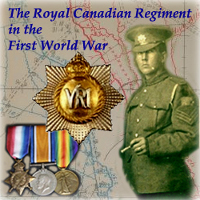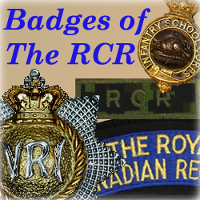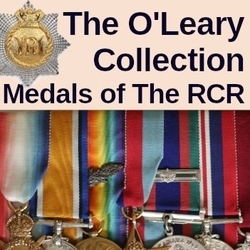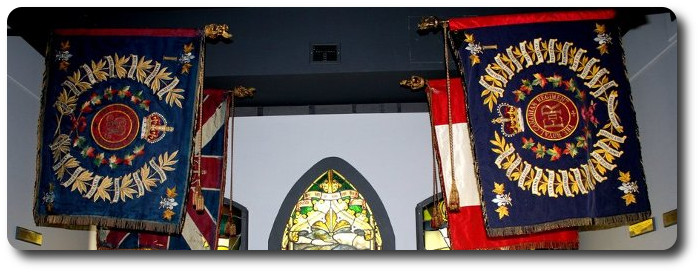
Researching The Royal Canadian Regiment
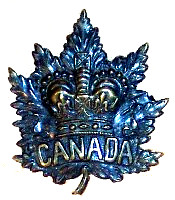
Badge worn by the Second (Special Service) Battalion of The Royal Canadian Regiment while serving in the South African War; 1899-1900.
The Contrast
By A. S. McCormick, M.D., No. 7730.
The Connecting File, April 1948
The remark is often made that "the fighting in the two World Wars was more severe than in the South African War. That is true, but men who served in South Africa and the First World War said Paardeberg was as tough as any man could want. Few soldiers of to-day have any idea just what the men of the 2nd Battalion went through.
This Battalion was in its personnel, physique and the fine class of men who composed the finest, in my opinion, that the Canadian Army ever had. British soldiers were heard to say that they considered the 2nd Batt. R.C.R. the finest in Africa. It was unusual among the troops of any country because it represented the entire country. A Co. from British Columbia and Manitoba; from Ontario B, C, D, Cos.; from Quebec E and F; from New Brunswick and Prince Edward Island G Co.; from Nova Scotia H Co. A fine class of men with 50 former officers who had resigned their commissions serving in the ranks. All but a few men were from other regiments—cavalry, field and garrison artillery, engineers, infantry, medical so that the Battalion could have taken over any station. In physique only the Guards were equal, of 1159 men there were 500 who were 6 feet or more and many five foot 10 or 5 feet 9. The minimum was 5 feet 8, but a few 5 feet 7 managed to get under the wire. In the British line battalions the minimum was 5 feet 3 and there were thousands even shorter, some of them very puny.
Now for some facts about the service.
Marches
Long treks day after day, averaging 17 miles, one day doing 30. Forced marches in which reveille sounded at 11 p.m., start at midnight, march till daylight at 7, halt for 4 hours, on again until dusk about 6 o'clock. And this day after day, the men being lucky to get 4 or 5 hours sleep in 24. Sometimes a sudden order: "get up and be ready to march in 15 minutes". This meant dress, put on boots and puttees, put on equipment, roll the section blankets together and put them on the wagon and fall in, all in 15 minutes. Marching in fours but spreading out to leave 4 or 5 feet space between men in order to allow the air to circulate. The days hotternhell, the nights freezing cold. After one uncomfortable night sleeping in a shirt wet from sweating during the day I solved the problem by taking off my shirt for the march and substituting my sweater. When we halted I removed the sweater and put on the dry shirt. At night a bed of rubber sheet and overcoat. On my body my shirt, sweater, cardigan jacket (coat sweater) and blankets arranged in 4 layers and in spite of this still being chilly.
The Weather
Sandstorms starting usually when "Come to the cookhouse door" sounded and spoiling the food and getting into eyes and nose and mouth. Terrible downpours of rain in the rainy season soaking us. Sometimes sleeping in puddles in pouring rain.
One More River to Cross
Crossing the Modder River, men up to their chests, each hanging on to the man in front or four men hanging together to avoid being carried away by the current. The river full of bodies of men, horses, mules, oxen and smelling like hell. Better luck crossing the 200 yard Vaal River in the dry season by jumping from rock to rock. British soldiers sloshing across in knee deep water.
Unwelcome Guests
Centipedes who grab you and dig in with all 100 feet. Can be removed only by a sharp knife. Tarantulas whose bite is supposed to be fatal. Scorpions whose bite causes great pain and sickness and is sometimes fatal. Horrible puff adders.
Food
A day's full rations consists of 5 army biscuits. We were many times on half, sometimes quarter rations. For breakfast coffee never sweet enough. For supper "Soup" made with evaporated vegetables and a piece of usually tough meat. "Oh for a dish of ham and eggs or a steak" someone will shout and a chorus of "kill that S.B." shuts him up.
Water
Our bottles held only one pint, sometimes all we had for the day. None for shaving or washing and everyone having forgotten what a bath was like. If we find water we fill our bottles by brushing away the slime from a frog pool or filling them from a pool dirty and stirred up by animals. Thirst was maddening and men drank anything in the line of water. The order was "all water must be boiled before drinking". Who is going to boil water and wait until it is cool enough to drink which will not be until hours later in the night. Result 350 cases of "Enteric fever" (Typhoid) when the Battalion reached Bloemfontain. "Hospitals" consisting of tents with patients lying on the ground with only blankets under or over them.
Equipment
The Oliver equipment, damned by everyone and men hoping that Dr. Oliver who designed it would have to wear it in hell. Rifle and bayonet 10 lbs., helmet 1, 150 rounds 10, overcoat 6, boots 2 1/2 or 3; water bottle, canteen, haversack, harness making a total of 55 or 60 lbs. Canadian boots no good. British boots with soles and heels reinforced by screws and plates; all right for the sand, but rocks tore off part of the soles. Men with sore heels, Teddie Austin of D Co. hobbling along with feet wrapped in puttees.
Uniform
We left Canada in rifle drill order uniforms. When we reached hot weather khaki duck uniforms were issued. They did not look badly but after hard marching and rain they disintegrated by entire sleeves dropping off, the body below the belts doing the same. Then we were given British khaki which was better. But no replacement for many months. Result holes 8 inches in diameter at the knees, no seat, some men no pants at all. Capt. J. C. Mason took a photo of the "Bare A-brigade," a squad in full marching order with no pants at all guess what the "A" stands for.
Our Appearance
No water to wash or shave, therefore all the men with full beards. Lousy with generations of grey backs in dozens swarming in the wrinkles of the clothes and making the night hell between trying to sleep and scratching. Men trying to sleep when a voice angrily says: "If these God damn lice would leave me alone I could get some sleep". For months never under a roof, seldom even tents. Dirty, you bet. We were like the second hand clothier who had suits hanging outside the store on the sidewalk. Every dog who passed stopped to pay his respects. When a customer one day tried on the suit he exclaimed: "this suit smells badly". The dealer said: "no, dat's me, ain't I dirty". At Springs some guards were posted on the huge coal dumps at the mines. Winds and blowing coal dust blacked our faces like those of minstrels as well as spoiling our food.
Travel by De Luxe Trains
From Pretoria to Capetown in open coal trucks, for three days and two nights in a downpour of rain. Of course the officers had coaches. But "what the hell do we care".
In spite of hardships and tough going I never saw a body of men so cheerful or' good natured or who could laugh through it all. With the "Singing band" of 30 singers in the centre we would march for miles in step to the songs of which favorites were "I'll Make Dat Black Gal Mine" and "Blow ye Winds in the Morning Boy's".
Pay
Fifty-six cents per day. After discharge a war gratuity of 5 pounds and the "Colonial Soldiers" bonus of 5 pounds. The Canadian Government gave each man script for 320 acres in the West. I sold mine for $700.
And that gives you some idea of what the men of the Second Battalion R.C.R. went through in addition to many days of fighting and marching more than 1200 miles.
Even the simplest orders, delivered in the sergeant's loudest voice, failed to make a group of training camp recruits understand what it was all about. The perspiring sergeant was about to give up in despair, when he apparently was struck by an inspiration. Disappearing for a moment around the corner of the barracks, he returned leading the regimental mascot - a sheep dog. "There you are, boy," be said, patting the dog's head. "See what you can do with them!"
